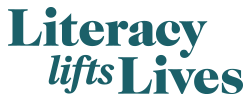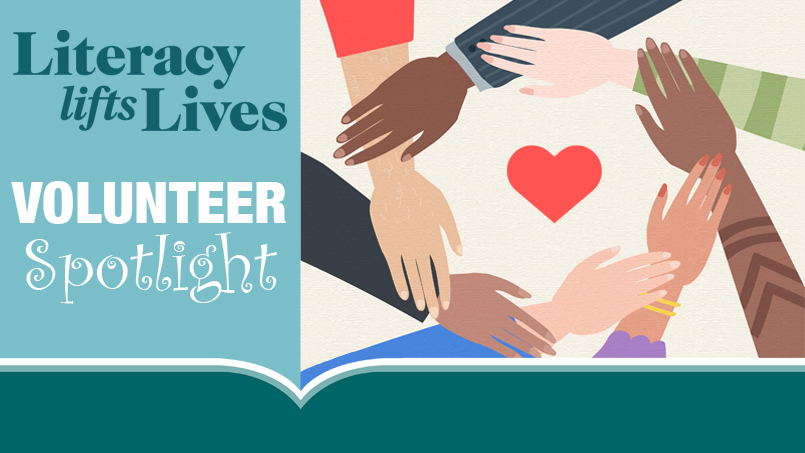Volunteer Spotlight: Catherine Mock
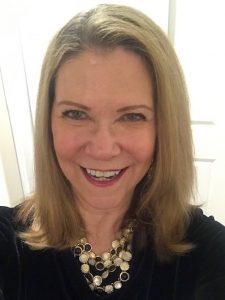 Catherine Mock has the kind of resume—from corporate training, running an insurance consulting business and strategic planning, to human resources and volunteer leadership—that makes her a formidable president of the Literacy Council Board of Directors.
Catherine Mock has the kind of resume—from corporate training, running an insurance consulting business and strategic planning, to human resources and volunteer leadership—that makes her a formidable president of the Literacy Council Board of Directors.
“I am very excited about my role on the board and to work with people who share my passion” about fulfilling the council’s mission to provide Frederick County’s adults with essential literacy skills through a deep and varied menu of programs. “We believe we’re poised to take the Literacy Council to the next level,” she says, and credits recently retired Executive Director Laurie Fisher for working so hard to get it to where it is today, spearheading a strategic plan that delineates the organization’s direction forward. Catherine praises the improvements in programming, grant writing, and fundraising, but she allows that one challenge sits high on her list.
“I think we’re one of the best-kept secrets in Frederick County. So often, when I tell people about the Literacy Council, they ask, how can I donate? And often they not only donate money, but also their time and become tutors.” Broadening visibility is a goal, she says. “I think we have a lot more to do to make people aware of what we offer.”
Her own understanding of what literacy meant began early on. “My dad grew up on a farm and his father took him out of school when he was nine years old. He always loved to read, but he couldn’t.” His lack of education denied him many opportunities in life. “Although he is smart, he just didn’t have the necessary book knowledge and reading and writing skills, and so he made sure that his children did. That’s near and dear to my heart.” She believes that if something like the Literacy Council were available to him then, he would have taken advantage of it.
She became an English major, thought about becoming an English teacher and earned enough credits to become a reading specialist. Later, when she and her husband were living in Virginia, “I wanted to get involved in the community, and one of the ways to do that was to teach English as a second language. For several years, I taught refugees from Cambodia and Viet Nam as well as Spanish speakers.” She saw once again the difference that being able to read and write made in people’s lives. “I think it is magic,” she says.
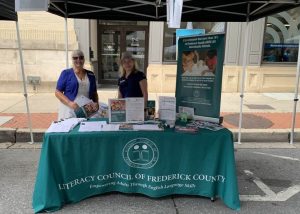
Her respect for literacy’s power remains strong. “I was really moved by one Literacy Council student’s experience,” she says. The young man couldn’t read, but what motivated him was that he couldn’t even read to his young children. He was a talented handyman, but he lacked a professional license, which limited how much he could earn. Then, he enrolled in the program and was paired with a Literacy Council tutor and his life began to turn around. The tutor got him a book about tools, which led to his learning other words and expanding his vocabulary. The tutor also brought him a copy of the contractors licensing exam and worked with him to read it. The student eventually passed the exam. Now he’s licensed and earning better money—and he can read to his children.
Catherine says she was “surprised to learn how many people the Literacy Council has helped get their U.S. citizenship. The tutors work so hard with their students to make this happen. Whenever we have our Celebration of Achievements ceremony and students get up and proudly say, “I’m a citizen now, I just love that we could help them to accomplish that.”
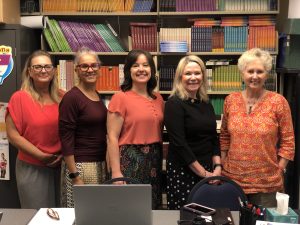 She says that as the Council enters the third year (of its 3-year strategic plan) “we’re learning how we can make our programs even more effective.” She’s particularly proud of the high demand for participation in the Workplace Literacy Program, which she describes as a “win-win” for both employers and employees. “In fact, a lot of other counties in Maryland want to use our program as a prototype. It has become a great model.”
She says that as the Council enters the third year (of its 3-year strategic plan) “we’re learning how we can make our programs even more effective.” She’s particularly proud of the high demand for participation in the Workplace Literacy Program, which she describes as a “win-win” for both employers and employees. “In fact, a lot of other counties in Maryland want to use our program as a prototype. It has become a great model.”
The Literacy Council’s mission inspires and energizes her, as do the people she works with. “This is a very positive place to work,” she says, “and going forward, I want to continue to always celebrate the wins that we have, to celebrate the successes, and to thank people and let them know they’re appreciated. It’s important to come to work knowing you are making a true difference.”


